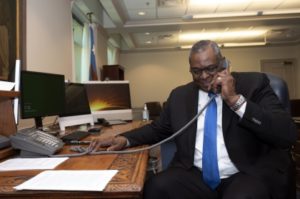
Secretary of Defense Lloyd J. Austin III speaks with the Uk’s Secretary of State for Defense, Ben Wallace, at the Pentagon on Jan. 21. He is the first African American to head the DoD. DoD photo by Lisa Ferdinando)
WASHINGTON — Lloyd J. Austin III made history when the retired four-star general was confirmed as the first African American Secretary of Defense last month.
While the questions asked during his confirmation process centered on international affairs, he promised legislators that his priorities included expanding DoD’s role in the nation’s management of the pandemic and transforming the culture of the military to root out sexual harassment and assault. A few days later, he backed up that promise by making those issues some of the first on which he took action.
During his confirmation before the Senate Armed Services Committee, Austin called the pandemic the greatest threat to our country.
“It’s killed 400,000 of our citizens, and that’s just an incredible loss of life,” Austin told legislators. “I think we have to do everything we can to break the cycle of transmission … I think DoD can add value to this effort in speed and scale.”
The Senate confirmed Austin at 11 a.m. on Jan. 22; earlier, Congress had voted to waive a seven-year cooling-off period for retired military to head the DoD. That paved the way for the confirmation.
By noon, Austin was being sworn in at the Pentagon. Immediately after, he chaired a COVID-19 briefing that included acting service secretaries, the chairman of the Joint Chiefs of Staff, and DoD COVID-19 Coordinator Max Rose.
His first memorandum to staff sent out later that day focused on pandemic response.
“Right now, of course, doing my job also means helping our country get control of the pandemic,” Austin wrote. “You have already come to the aid of our nation’s healthcare professionals. You can expect that mission to continue. But we must help the federal government move further and faster to eradicate the devastating effects of the coronavirus. To that end, we will also do everything we can to vaccinate and care for our workforce and to look for meaningful ways to alleviate the pressure this pandemic has exerted on you and your families.”
Military Sexual Assault
Austin also made a strong commitment during his confirmation hearing to combat the rising rates of sexual assault in the services. In 2019, DoD documented 7,925 reports of sexual assault, representing a 3% increase from 2018. DoD officials have recognized that this number is likely much higher, as sexual assault is an underreported crime. This has corresponded to an increasing number of veterans presenting at VA with military sexual trauma (MST).
“I take the issue of sexual assault seriously and personally,” he said. “We have to go after the culture. We have to go after the climate. This is a leadership issue and a readiness issue. It starts at the top, but we have to work from the bottom and top simultaneously.”
Legislators pressed him to not only focus on the culture but on the mechanisms of punishing offenders.
“Every secretary of defense for the last 25 years has said there is zero tolerance for sexual assault in the military. But every time they say there’s zero tolerance, we look at the facts. We look at the evidence; we look at how many sexual assaults are committed, how many go to trial, how many end in conviction. And we don’t seem to improve at all,” declared Sen. Kirsten Gillibrand (D-NY). “Last year, DoD announced a record number of sexual assaults reported by or against servicemembers and the lowest conviction rate for their assailants on record.”
Gillibrand has advocated in the past for DoD to change its regulations to allow crimes like sexual assault to be handled by military prosecutors rather than commanders. During the confirmation hearing, she noted that President Joe Biden had gone on record supporting such a move. When she asked if Austin would also support a change in sexual assault prosecutions, he declined, but did not rule it out as a possibility.
“If confirmed, I would like to work with the chain of command and rapidly access what things there are that need to be fixed or addressed and make those recommendations to the president,” he said.
On his second day in the role, Austin made good on his promise, giving service chiefs two weeks to deliver a summary of the sexual assault prevention measures each branch has taken, along with an assessment of which worked and which did not.
“I know this has been a focus for you and the Department’s leadership,” he wrote in the memorandum. “I know that you have worked this problem for many years. I tried to tackle it myself when I, too, commanded. We simply must admit the hard truth: we must do more. All of us.”
President Joe Biden has ordered a 90-day commission to pursue solutions to sexual assault in the military. Austin told DoD leaders that he wanted answers sooner.
“We will aggressively support that [commission’s] effort,” he wrote. “But I do not want to wait 90 days to take action.”
